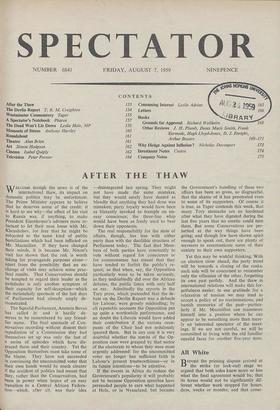AFTER THE THAW
'jjaLcoME though the news is of the TY international thaw, its impact on domestic politics may be unfortunate. The Prime Minister appears to believe that he deserves some of the credit: it is hard to see why—the effect of his visit to Russia was, if anything, to make President Eisenhower's advisers more re- luctant to let their man loose with Mr. Khrushchev, for fear that he might be subjected to the same kind of public humiliations which had been inflicted on Mr. Macmillan. If they have changed their minds, it is because Mr. Nixon's visit has shown that the risk is worth taking for propaganda purposes alone— apart from the possibility that an ex- change of visits may achieve some prac- tical results. That Conservatives should be tempted to regard their leader as the Pathfinder is only another symptom of their capacity for self-deception—which the melancholy spectacle of the last days of Parliament had already amply de- monstrated.
The Squalid Parliament, Aneurin Bevan has called it: and it hardly de- serves to be remembered by any friend- lier name. The final spectacle of Con- servatives recording without dissent their repudiation of a Commission they had themselves set up was only the last of a series of episodes which have dis- graced them and their country. Yet the Opposition themselves must take some of the blame. They have not succeeded in convincing the uncommitted voter that their own hands would be much cleaner if the accident of politics had meant that they, rather than the Conservatives, had been in power when hopes of an easy transition to a Central African Federa- tion—which, after all, was their idea —disintegrated last spring. They might not have made the same mistakes, but they would surely have denied as blandly that anything they had done was mistaken; party loyalty would have been as blatantly invoked to trample on un- easy conscience; the three-line whip would have been as freely used to beat down their opponents.
The real responsibility for the state of affairs, though, lies less with either party than with the duolithic structure of Parliament today. The fact that Mem- bers of both parties have constantly to vote without regard for conscience or for commonsense has meant that they have tended to forfeit the public's re- spect; so that when, say, the Opposition particularly want to be taken seriously, as they undoubtedly did over the African debates, the public listen with only half an ear. Admittedly the reports in the Tory press, which pretended that the de- bate on the Devlin Report was a debacle for Labour, were grossly misleading; by all reputable accounts the Opposition put up quite a worthwhile performance, and no doubt the Liberals would have added their contribution if the various occu- pants of the Chair had not sedulously ignored them. But in any case it is very doubtful whether the merits of the Op- position case were grasped by that sector of the electorate to whom they were most urgently addressed: for the uncommitted voter no longer has sufficient faith in Labour's present trustworthiness—or in its future intentions—to be attentive.
If the events in Africa do reduce the Government's popularity it will probably not be because Opposition speeches have persuaded people to care what happened at Hola, or in Nyasaland, but because the Government's handling of these two affairs has been so gross, so disgraceful, that the shame of it has penetrated even to some of its supporters. Of course it is true, as Taper contends this week, that many Tory stomachs are so hardened after what they have digested during the last five years that no emetic could turn them. But some Conservatives are per- turbed at the way things have been going; and though few have shown spirit enough to speak out, there are plenty of waverers to communicate some of their anxiety to their own supporters.
Yet this may be wishful thinking. With an election close ahead, the party trend will be towards a closing of the ranks: each side will be concerned to remember only the villainies of the other, forgetting its own past perfidy. And the thaw in international relations will make this for- getfulness easier; in our gratitude for a relaxation of tension we may tend to accept a policy of no recriminations, and banish memories of the past—particu- larly if Mr. Macmillan can manoeuvre himself into a position where he can appear to be something more than mere- ly an interested spectator of the meet- ings. If we are not careful, we will be committed to living with the old familiar squalid faces for another five-year term.


























